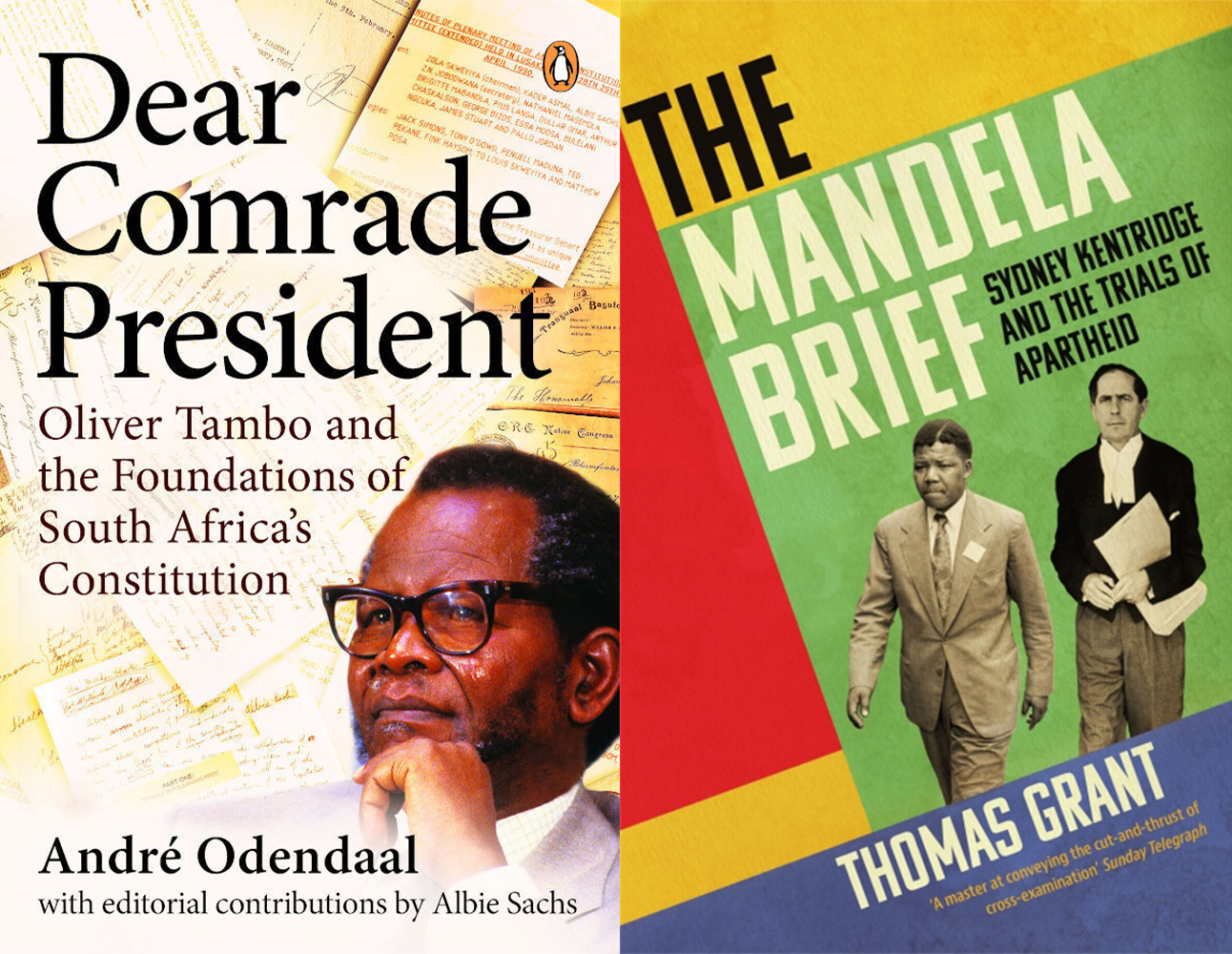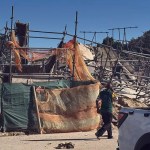Professor André Odendaal, a most distinguished historian, together with contributions from Justice Albie Sachs, an iconic figure within the context of constitutional development in South Africa, has written an account of how the ANC came to develop and promote the idea of constitutional democracy, in a book entitled Dear Comrade President: Oliver Tambo and the Foundations of South Africa’s Constitution. Thomas Grant, an English QC, recently penned a book entitled The Mandela Brief: Sydney Kentridge and the Trials of Apartheid. Both focus our attention on the rule of law and governance.

Let us begin with the Kentridge book. Grant documents the extraordinary career during apartheid South Africa of Sydney Kentridge, unquestionably the finest advocate that this country produced in the second half of the twentieth century (and arguably the best of all time).
Grant discusses Kentridge’s defence of Winnie Mandela, the subject of the cruellest forms of oppression by the apartheid government; Bram Fischer QC, who, shamefully, was struck off the role of advocates and whom Kentridge represented during this disgraceful episode; the sham of the outcome of the Biko inquest which revealed the corruption of so much of our legal system; and the trial of the Dean of Johannesburg, Gonville ffrench-Beytagh. In all of these chapters, the role of fearless hugely skilled advocacy in creating a belief that the rule of law matters is luminously documented.
For anyone, particularly the parliamentary committee dealing with the possible impeachment of the Public Protector, who doubtless are concerned with the role of cross-examination when employed as intended, Grant’s description of Kentridge’s cross-examination of State witnesses who were cynically employed to convict opponents of the apartheid regime should be compulsory reading.
The careful examination of evidence and the painstaking interrogation of the version put up by these witnesses which focused on revealing the mendacity of their versions, stands in stark contrast to the generalisation and vague claims coupled with the unbridled abuse of witnesses which has characterised proceedings before the parliamentary committee.
Heroic advocacy
If Grant’s book highlights the role of Kentridge (and there were many others who performed similar heroic advocacy during this period, including Ismail Mahomed, Arthur Chaskalson, George Bizos, Denis Kuny, David Soggot and Dullah Omar), Odendaal’s work provides a detailed account of how the Oliver Tambo-led ANC sought to reconstruct a legal system for a nonracial, democratic South Africa.
As Odendaal correctly notes, the journey which began in the 1980s to provide constitutional content to the Freedom Charter of 1955 culminated in a detailed constitutional framework for a future South Africa. The process involved numerous meetings and consultations with the ANC’s National Executive Committee and countless debates within the ANC’s Constitutional Committee, which included Dr Zola Skweyiya, Professor Kader Asmal and Albie Sachs, initially chaired by Professor Jack Simons. The end product was unquestionably an indigenous document which aimed to ensure that the rule of law worked to the advantage of the entire South African nation as opposed to a select few, predominantly white, South Africans.
Odendaal’s account reveals the outcome of a South African endeavour which showed up the project of liberation of South Africa in its best possible light. It is a book which the RET faction and certain Cabinet ministers who now sit at the centre of official power and who have in unbridled populist fashion criticised the 1996 Constitution should read carefully.
Visit Daily Maverick’s home page for more news, analysis and investigations
When compared to Odendaal’s account, their statements reflect either a wilful elision of the history of the movement of which they claim to be proud members or an appalling ignorance of the painstaking efforts which led to constitutional democracy in South Africa.
Odendaal concludes with a poignant observation that the dreams which powered these constitutional initiatives which began in the 1980s ran aground against the rent-seeking corruption, lack of accountability and disregard for the rule of law which dominate contemporary South Africa.
To return to the journey conceived by these architects of political and legal change, both the state and certain elements of contemporary civil society need to change course. A successful democracy committed to substantive socioeconomic transformation needs an accountable state and a vibrant civil society.
Two unrelated examples should suffice to reveal precisely how close South Africa is to a complete disregard of the rule of law, and the failure of the state and certain elements of civil society to vindicate the earlier noble aims which powered the Tambo-led ANC to develop a Constitution to underpin meaningful democracy for all.
Construction mafia impunity
There has been much reporting recently of construction mafias which have been rife in KwaZulu-Natal since probably 2015, that have now spread to other parts of the country. Heavily armed groups occupy construction sites, demanding a 30% cut of the proceeds of any development. If payment is not forthcoming, the entire construction project is disrupted.
Although the identities of those extracting corrupt rents are known, the police and Crime Intelligence seem to have done absolutely nothing, thereby making a mockery not only of President Cyril Ramaphosa’s attempt to attract investment into South Africa, but also the state’s commitment to law enforcement.
This silence means that a widespread mafia places into jeopardy any construction project and therefore significant prospects of economic development. The somnambulance of the government is at war with a society which upholds the rule of law and where the police vindicate the principle of accountability.
Grant’s book reminds readers of the history of an official mafia which ran South Africa in the guise of government for a very long time. This model has now been replaced by those who hold legitimate economic development to ransom and with impunity totally trash the objectives of designing a transformed constitutional framework for a democratic South Africa.
Judge President John Hlophe
There are equally negligent elements of civil society For example, a range of civil society organisations have rushed to defend the possible suspension of Western Cape Judge President John Hlophe, found guilty of gross misconduct and thus liable to possible removal from office. Most recently, it appears from uncontradicted press reports, the National Association of Democratic Lawyers (Nadel) contended that the Judge President should not be suspended from office until he has exhausted every single avenue of appeal in his attempt to set aside the finding of the Judicial Service Commission (JSC).
While Judge Hlophe has every right to take his failed review application to the Supreme Court of Appeal, it remains so that a group of lawyers would hardly argue that an employee, found guilty of gross misconduct in the workplace by an independent disciplinary body, and who then seeks to set the decision aside on review before the Labour Court, should remain in his or her job, even when the suspension is accompanied by payment of full remuneration.
Somehow, when it comes to the Judge President of the Western Cape, different principles apply. Ironically, Odendaal has an account of the establishment of Nadel, which then became an extremely important organisation in the process which culminated in a constitutional democracy. It confirms that a critical player in its creation was Pius Langa, later to become Chief Justice of South Africa and whose entire career was dedicated to the construction of a nonracial, nonsexist egalitarian society.
One would assume Nadel knows that Chief Justice Langa has been the subject of vicious personal attacks by Judge Hlophe which commenced once the Chief Justice decided to lead the complaints against Judge Hlophe’s conduct which led to the finding by the JSC that he should be impeached. That should have, at the very least, given it pause.
The need to renew the vision which the ANC initially sought to instil through its constitutional proposals can now only take place if civil society is vigilant and deeply committed to the principle of accountability and the enforcement of democratically produced statutes. Similarly, the country needs a state that functions for the benefit of all.
The silence from the government concerning the construction mafia is illustrative of a broken system. It seems powerless or reluctant to act. In addition, if key elements of civil society show so little concern for the integrity of the judiciary, then this sadly illustrates how hollowed out is society’s vision for a democratic South Africa.
Mercifully, there are vigorous elements of civil society committed to democracy and the integrity of the law. They are now the country’s main source of hope. DM




















The ANC does not want to abide by the South African constitution as it does not suit their primeval instincts. Our constitution was developed by intellectuals, for a modern, mature, moral and educated society as a whole. Something we are not, mostly because of the ANC. The ANC is much like a wild carnivorous scavenger that eats as much as it can, down to the bone because he does not have control of what tomorrow will hand it out. The leader of the pack will take the biggest helping. The ANC is very similarly aligned. Unlike most progressive people of the 21st century, it cannot vision tomorrow, can’t plan for tomorrow and will simply devour whatever it can today while the going is good. The ANC pack, will simply follow its leaders into oblivion if needs be.
Excellent comment !
I absolutely agree with the sentiment but not the comparison: animals do not eat until they are morbidly obese. They behave like greedy sociopaths.
Great description of the anc, as an organisation of trough feeders without integrity.
Reluctant is not the right word,should be “will not”.Their raking money into their own pockets, why would they stop stealing, being communists , but loving the spoils of capitalism.